Hamish McLachlan Q&A: Former star jockey Tye Angland recalls freak fall that left him a quadriplegic
Tye Angland had a secret signal he would send to let loved ones know he was OK after a race fall. But on this occasion, he couldn’t lift his arm to do it. At that moment he knew he was in serious trouble.
SuperRacing
Don't miss out on the headlines from SuperRacing. Followed categories will be added to My News.
Tye Angland is a country boy who is very easy to like.
Funny, laid back, witty and generous.
A great horseman who rode just under 1000 winners on the racetrack, 11 of those at the highest level.
Stream over 50 sports on-demand with KAYO SPORTS on your TV, computer, mobile or tablet. Just $25/month, no lock-in contract. Get your 14-day free trial and start streaming instantly >
A father of three young kids, Angland had a race fall in late 2018 and is now a quadriplegic.
Through it all, he hasn’t lost his positive outlook or ability to have fun.
READ BELOW THE FULL Q&A WITH SEVEN RACING PERSONALITY HAMISH MCLACHLAN
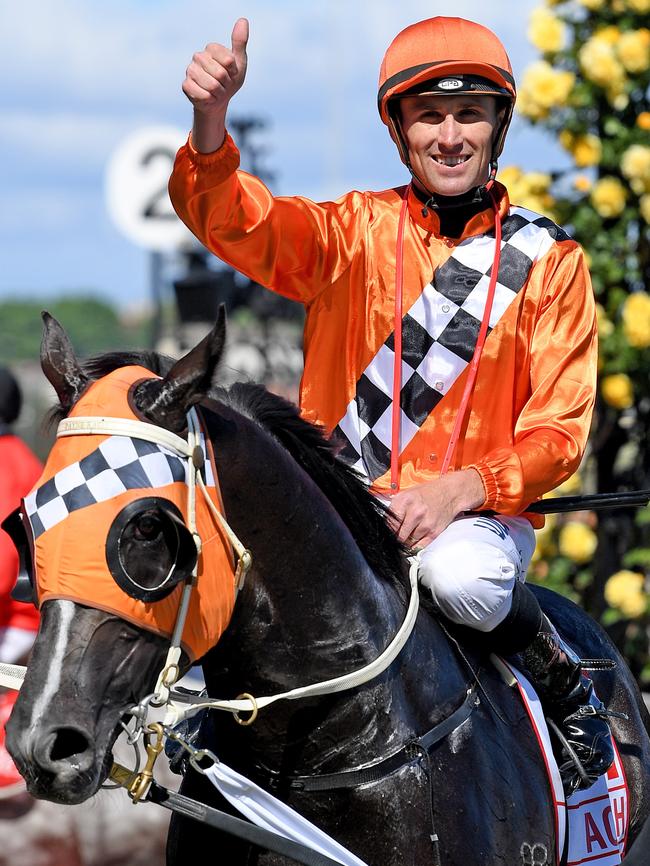
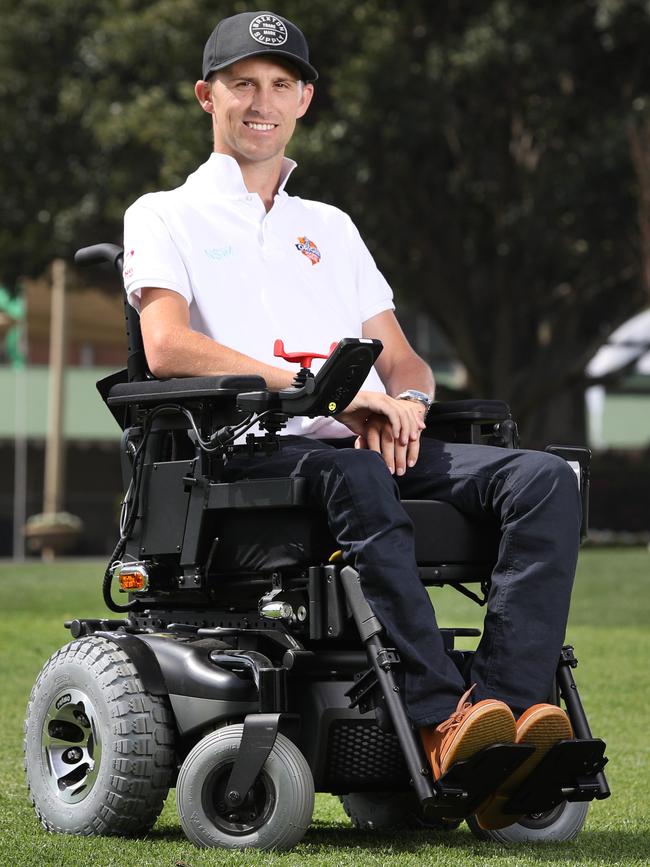
HM: Who’s the Wantabadgery Wizard?
TA: Me!
HM: Who dubbed you that?
TA: Country race caller Alan Hull. Once I got to the Wagga carnival and had some success, he threw that line in! I don’t mind it, actually.
HM: How many people live in Wantabadgery?
TA: Apart from the Anglands, not too bloody many! A few hundred I guess. It’s a small country town in NSW about 20km from Nangus which is known by bugger all. It’s not far from Wagga. God’s country!
HM: You grew up on horses as your old man had some acres and grabbed as much property as he could to farm.
TA: Dad moved over from New Zealand when he was about 20 to continue on the rodeo circuit. Then we came along and Dad kept at the rodeos, so that’s sort of what we knew. We rode every day — we’d just get on a horse and go for a ride. We’d go to gymkhanas, rodeos and camp drafts. That’s where the love of the horse all started.
HM: What did your old man do in the rodeos?
TA: He was a bareback rider. hat’s what got us into rodeo straight away.
HM: You were looking over the rails thinking, I’d love to do that one day?
TA: Exactly. My ambition growing up was to be a world champion bull rider. I had the rodeo genes in me from the get go! I tackled that until I was about 15. I won an Australian junior steer riding title just before I came to the racing game.
HM: Was the last time you rode a bull before you became an apprentice?
TA: I’d say yes, but I’d be telling a lie. I made the circuit finals about three months into my apprenticeship. I didn’t tell my boss, but I snuck back and won the circuit finals!
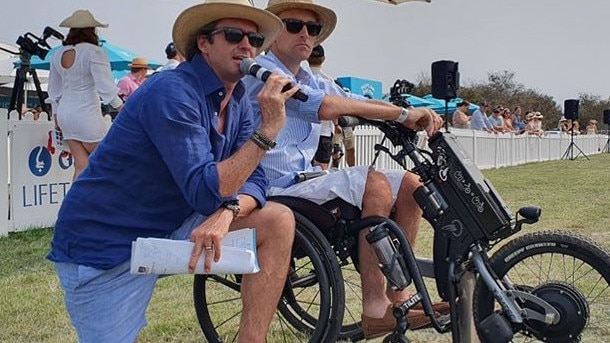
MORE RACING:
HOW RACECALLER MATT HILL ALMOST DIED IN CHINA
ALWAYS HOPE WITH PAYNE IN JOCKEY’S CORNER
HM: What do you experience when you’re on a bull trying to stay on for eight seconds?
TA: It’s an enormous rush. The adrenaline leading up to jumping on is extraordinary — a mixture of excitement, anxiousness and fear — it’s a potent cocktail! If you ride well, the adrenaline rush and pure enjoyment afterwards is hard to top! There’s a lot of holding on, trying to stay in the right position, and find a rhythm. You don’t see a lot — it’s just a big blur.
HM: Who were you an apprentice to when you snuck out to ride the circuit final?
TA: I only had one boss and that was Garry Frazer.
HM: And you liked him so much that you married his daughter.
TA: Correct.
HM: (laughs) When you’re an apprentice and you start seeing your boss’s daughter, how does the conversation go?
TA: Between the boss and the apprentice, or the boss and his daughter?
HM: There’s two conversations — let’s hear both of them.
TA: It was pretty smooth sailing actually. There was no real conversation centred around me starting to date Erin — I avoided it I guess! It all just slowly happened — a friendship first and it went from there. Now Erin is a super wife, brilliant mother and bloody lucky to have me in her life!
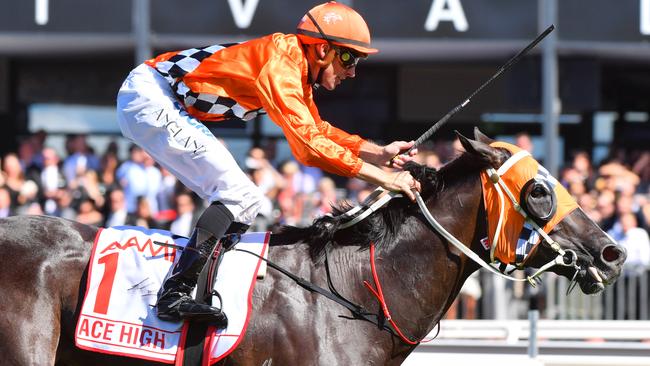
HM: She is! From apprentice to 995 winners — 11 of them Group Ones. If I said you can have your favourite moment in racing again, where would you be?
TA: Winning the VRC Derby on Ace High was a floating-on-clouds moment. Then the second day of The Championships in Sydney the following year I was beaten on Ace High in the Derby, but then came out and won the Group 1 T.J. Smith in the next race on Trapeze Artist. From a second and feeling flat to 40 minutes later on top of the world. That’s how quickly things change in the racing game. And sometimes in life. You never know what’s around the corner. I was lucky to have Ace High at the same time as well. I had a really good three-year-old stayer, and three-year-old sprinter. They gave me most of my career highlights. I felt as though my career was just about to really get rolling as I was getting those better horses and keeping those rides.
HM: Later that year, a fall changed everything. What do you remember about the races in Hong Kong on November 25, 2018?
TA: I remember everything — I remember it all. I was conscious the whole time. When I left living in Hong Kong I said I’d always go back and ride when I could. I got the phone call to go over there, and I was excited. I picked up some nice rides for John Size, got a winner, ran second in the main race and all was going well. Then in the second last race of the day, the horse I was on, Go Beauty Go, just stumbled out of the gates, nothing malicious or abnormal, but I just landed wrongly. It was a fall you’d walk away from 99 times out of 100.
HM: How many strides do you reckon you took?
TA: It stumbled in its first stride. I tried to regather and we wouldn’t have made it two strides when I landed. We were going as slowly as a horse goes at any point in the race. Just a freak thing.
HM: You’ve fallen off at top speed, you’ve fallen off bucking horses and bulls. My guess is as you were going towards the ground you would have been thinking, “What a bugger, I’ve just lost an opportunity to win a good race” but within a millisecond, you would have been thinking very different things.
TA: Spot on. As I was heading to the ground there were no bad thoughts. As you know when you fall, it all happens very quickly. When he stumbled, I was holding on to the reins and you get that jerk as they lurch forward unexpectedly. If the horse stumbled a bit worse than what it did, it would have helped me get that rolling momentum.
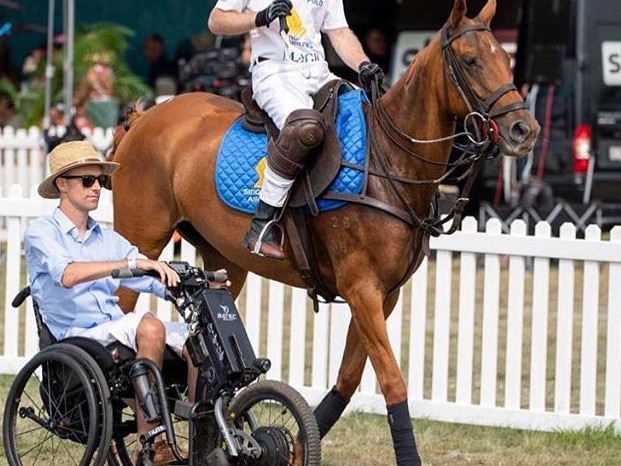
HM: Over the front of the neck and been OK?
TA: Exactly, but he stumbled in a way that jerked me forward and speared me into the ground rather than allowing me to sort of roll, if that makes sense.
HM: And immediately you knew things were worse than any fall before.
TA: Yes, I knew. Erin and I always had an understanding that whenever I had a fall, I’d raise my hand to let her know I was OK. I’d usually roll out of falls quite well. I think it was riding horses from a young age and getting thrown off, learning how to tuck and roll. With a lot of my falls I was able to get up and walk away. If I raised my hand, everything was OK. That was the one time that I couldn’t.
HM: Into an ambulance, straight to ICU. What’s the process from there?
TA: It was all the basic tests and scans, trying to work out what was going on. I had a handful of friends that were already over there with me, so I had that support as well. From scans, it was into surgery.
HM: You’re the most positive bloke I know. Were you hopeful that you were going to be OK or was there a sense of “this is no good”?
TA: I was trying to be positive, but Erin and I knew something wasn’t right, and it was more serious than anything we’d dealt with before. It was so daunting being in a foreign country with the language barrier. A terrible time was made tougher with a foreign language and everything feeling distant.
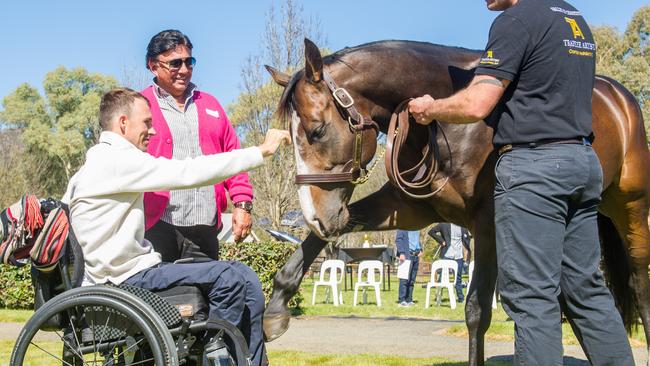
HM: Who walks in and gives you the news that it’s unlikely you’ll walk again?
TA: It didn’t come overnight and it was never delivered in one line as it took a while to get to that point. It was more “you’ve been dealt this situation, things take time to heal, this is what it could be, this is what we will keep testing for, this is where we could be going”. No one’s really come in and said, “You’re never going to walk again”. That’s something that I know is probably not going to happen though.
HM: Is there a chance you can?
TA: There are people doing studies of stem cell transfers, and they think, years down the track, the cure could be there. I’ll never say never, I’m not like that. I’m willing to keep myself fit and strong, and keep all the muscles doing the right things so that one day, if the opportunity arises, I can take it. Once I got home, we had another surgery, and then you start your physio. As you start meeting different doctors, and talking to different patients, that’s when it all becomes real that life is most likely going to be in a wheelchair.
HM: Once you’d digested that, how did you fare telling your three young kids that things would be different for Dad?
TA: That was the hardest part of it all by a long way. They knew I went to Hong Kong to ride, but they didn’t know what had happened. We tried to keep that from them until we got home, because we didn’t want them worrying. They thought that we were on a holiday! When we got back, Erin took them down to the park, and that’s when she broke the news to them. Lexi said straight away: “At least he didn’t die, Mum. Dad’s alive!”
HM: They have an beautiful ability to simplify and keep things uncomplicated. What a great line from Lexi.
TA: Yeah — what a great way to look at it. Seeing the kids for the first time since the fall was bloody difficult. Lexi came in by herself, and because I was in ICU, with tubes and cords everywhere, it was a little bit daunting for her. She jumped on the bed and gave me a big hug. Isn’t it amazing what a hug can do from one of your kids!
HM: I’ve heard you say one of your great frustrations now is your inability to do what you did, with the kids.
TA: That’s what gets me the most, I was so active with them, but I’m finding there are ways around it. I’m still here, I’m able to do things with them, but if I wasn’t in the chair it would be a lot different. I’d be running around kicking the ball. But the reality is things could be a lot worse.
HM: You’ve said, “I haven’t lost much and I’ve gained a lot more”.
TA: I’ve lost independence, the ability to walk and run, but I’ve really learned to enjoy the little things and I realise there will always be omeone a whole lot worse off than me. I’m able to still get around, and although I’m restricted, I’m still here and I’m still enjoying life with Erin and the kids. I have good friends and support around me. There are some people that don’t get to leave that hospital bed. We’ve all got our own problems, but there is always someone that is a lot worse. We all have to think about that sometimes and enjoy what we have.
HM: Has your relationship with Erin strengthened?
TA: We’ve always been pretty strong and understood each other really well. She’s had so much thrown at her but she has never blinked. She’s taken it all on with arms wide open and she’s coping with it really well. She is an extraordinary woman and I’m so lucky to have her in my life.
HM: Have you had or do you endure incredible lows or have you somehow been able to avoid that?
TA: As positive as I’ve tried to be, I wouldn’t say that I’ve avoided it completely. You go through different stages, the main thing is having a great support team, and the right crew around you to keep your mind healthy.
HM: Your lowest point?
TA: When I first started to come home from hospital in Australia. The first visit home was good, I was let out for the day and came home for lunch. I thought, “I am one step closer, I’ll be able to leave the hospital soon” and I felt I was back in my comfort zone. The second time I came home it really hit me: ”Shit, this is real. I can’t go outdoors really, I can’t mow my lawns or pick up the rubbish and take it out. I can’t do what I used to do. Life won’t be the same.” That was the first time that I realised things were going to be completely different and I really struggled that day. I left home to go back to the hospital and cried the whole way, I was just an emotional wreck. That was the first time that I realised how hard things were going to be.
HM: The fall was in November, when would that have been?
TA: Mid-January. I hadn’t been home for two months.
HM: But what you’ve been able to achieve is incredible — you have regained an amazing amount of independence and are now a media commentator and a lawnmowing specialist!
TA: Thank you mate — yeah, I’ve been lucky. I enjoy both and am lucky to be able to go back and have fun days on the racetrack. I’m able to get there and see those people that I had plenty of good times with. The lawnmowing is the little hobby on the side and I’m amazed I can knock a lawn over!
HM: On your business card you can have “Lawnologist and Media Guru”.
TA: I might do that. I worked in those jockeys’ rooms for nearly 13 years, a lot of good times and good friendships were developed. Getting back to the races means getting back with all my colleagues and some normality.
HM: You’ve got an extraordinary attitude. What’s technology like for you now?
TA: It’s all obviously tech for my hands or voice. If I’m typing a text, I might do the voice activation, which is a little bit quicker and easier. On the back of my case I’ve got a little extension where I can just put my thumb through it to hold it up. I can operate a phone quite well now, but with my limited function it’s all about adapting, and learning new ways to do things. I can pick up a drink now, and hold a fork in a certain position, but I haven’t got that force to stab food, or cut it.
HM: Things that you took for granted for about 30 years.
TA: Things you never thought you’d ever have to learn again. I taught my kids to use the knife and fork, now they are helping me learn again!
HM: And you have had a lawnmower souped up.
TA: I was in rehab and a guy came and saw me, and we were chatting away about mowing. He mentioned a lawnmower that’s controlled just by joystick, which is very similar to the power wheelchair I have. Once I got home I started a bit of research, and I found a guy called Jared Lovie from Country Clipper mowers. I started emailing him as he imports them from America. We got talking about what I would need — a joystick, we put on a little roll bar with a seat belt, changed the seat around a little bit to suit me a lot more. Once I’m up on the lawnmower, I’m in full swing.
HM: How do you quote your jobs — hours or metres?
TA: I just make it up depending on how much I think you’ll pay.
HM: I thought you might. What have you learnt about yourself?
TA: I’ve learnt patience. I had to be patient. Things take time.
HM: And about life?
TA: That there’s a lot of good in people. It’s all about years of moulding yourself and getting the right people around you for when things like this happen. Not that people have to go out of their way, but they’re there for you. And they want to be there for you. There’s a lot of good people in the world, and everyone’s happy to help.
***Tye Angland is part of the Channel Seven racing team.
